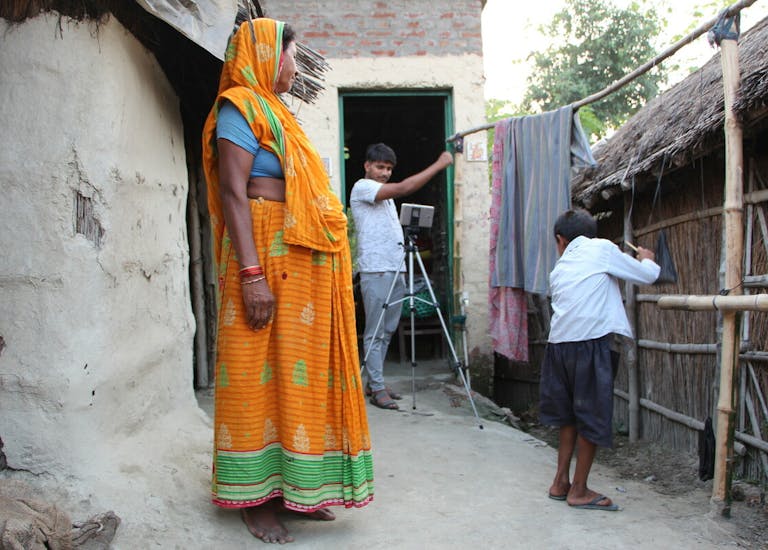Telerehabilitation II
Liliane Fonds has been working closely with local partners to support teleconsultation and telerehabilitation projects since 2016, long before COVID-19 accelerated digital developments.
Digital technology
In India, a country with many “hard-to-reach” areas, Liliane Fonds’s partners CHAI and JVS were the first to embrace telerehabilitation. They use digital technology to connect Community Based Rehabilitation (CBR) workers active in remote communities to a physiotherapist based at their Telerehabilitation Unit. The fieldworkers take photographs and videos of the children and of the treatment they administer and these are send to the physiotherapist via a digital portal. This physiotherapist supports the CBR workers with diagnosis, developing individual treatment plans, referring to other services, and providing appropriate basic therapies. Through this supervision the capacity of CBR workers to assess and deliver basic rehabilitation services and the quality of rehabilitation services delivered to children and youth in remote areas enhances.
Learning
Given the innovative character of delivering services using digital technology, learning is at the center of these projects. The two partner organisations have regularly exchanged their experiences and, for example, jointly developed assessment forms with support of Liliane Fonds. To first test whether digital delivery of rehabilitation services could work, CHAI initially used existing digital platforms like Skype, WhatsApp, and YouTube to connect in “real-time” to the homes of children and youth with disabilities. JVS developed an app from the onset. Initially this app only worked through “store and forward” technique, which means a digital image is “stored” and then sent (“forwarded”) to another location. The limitation was that it didn’t allow for “real-time” connections but data protection was much better secured. In addition to the app JVS also developed a web-portal to provide information and education about different type of disabilities, how to perform daily care with children with disabilities, etc. Later the app was improved to allow the physiotherapist to directly interact with the family and CBR worker at the home of the child with a disability.
Great opportunities for remote and underserved areas
In 2021 partner NORFIL in the Philippines, a country made up of more than 7000 islands, embarked on a project using digital technology to bring quality rehabilitation services in reach of children with disabilities living in remote and underserved places. NORFIL examined the experiences in India and, taking on board the learning, decided to develop its own app. It recognized that the health systems, health and technology literacy and workforce capacity in the Philippines differ from those in India and that the functionality of the app needed to be different. Contrary to India where CBR services are mainly delivered by NGOs, in the Philippines there is a government structure to deliver community-based medical and rehab services to link on to. However, specialized rehab services are scarce and often only available in urban areas.
The AKTIBU app in the Philippines, is a mobile application that is cloud-based including electronic medical record & backend system to create a complete system for screening, assessment, consultation, intervention, referral, monitoring, teleconsultation and telerehabilitation between community health workers in geographically isolated areas and healthcare professionals in the metro Manila. Before scheduling a consultation the child will be screened for disability by the local health worker or CBR worker using the UNICEF Washington Group Child Functioning questionnaire and Gross Motor Functional Classification system (for those diagnosed with Cerebral Palsy). After the screening process, the local health worker or CBR worker will save the data in the mobile application, and the primary care physician (PCP) in the rural health unit/center will conduct further assessment before referring the child for teleconsultation to the rehabilitation medicine doctor and/or developmental pediatrician based in an urban area. If other health services are needed, the child will be referred to a physician (in different area/specialties based on the child’s needs), a certified prosthetist or orthotist, a rehabilitation team (occupational therapist, physical therapist, speech and language pathologist.
Accesible health care
Teleconsultation and telerehabilitation is a fast developing area that offers great opportunities to reach children with disabilities in remote and underserved communities. Liliane Fonds therefore works closely with its local partners and professionals to fully understand the possibilities, but also the limitations, for example obtaining accurate diagnosis without physical examination or special clinical equipment needed, difficulties in connections or technological literacy, or privacy and confidentiality concerns. Further develop context specific teleconsultation and telerehabilitation means and bridge the gap to accessible health care.
